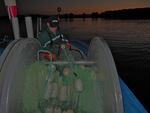
File photo of a gillnet fisherman on the lower Columbia River. The Oregon Fish and Wildlife Commission has approved a fund to offset losses for these fishermen as new rule restrict their activities on the lower Columbia.
Cassandra Profita
The Oregon Fish and Wildlife Commission on Friday approved a new fund to help commercial gillnetters adapt to upcoming restrictions on how they fish in the lower Columbia River.
The state's new policy will eventually ban gillnet fishing on the lower Columbia's main stem. It allows commercial fishing with other types of nets.
The commission approved a transition fund of $500,000 to compensate gill-netters for their losses and help them purchase new fishing gear.
Gill-netters say they oppose the new policy, and they don't want transition funds. Plus, they say, once the funds are divided among 300 permit-holders, it won't amount to much money per person. The state estimates it will cost a gillnetter $190,000 to switch over to a seine netting operation, one possible alternative.
"We don't want this money. I don't want this money," said gillnetter Chris Cameron. "We're in a time when people are trying to make a living. We're talking about two thousand dollars here. That doesn't do nothing."
Jim Wells, president of the gillnetting group Salmon for All, told commissioners fishermen testing out alternatives to gillnets haven't been successful. So, he said, it's unlikely any gillnetters will be applying for funds to buy alternative gear. Right now, he argued, gillnets are still allowed on the river, and gillnetters had a good year of fishing, so they won't have suffered any economic harm from the new policy yet.
"I'd say just table this for six months," he told the board. "We don't know what gear to transition to. There's no economic harm at this point."
Staff advisors to the commission said the transition fund is required by the law that put the new fishing policy in place.
The Oregon Department of Fish and Wildlife would grant the funds to counties with transition programs designed to distribute grants to gillnetters.
